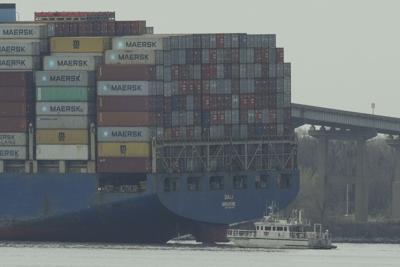The stunning bridge collapse in Baltimore isn't likely to have a big impact on vessel traffic or volumes in Charleston, maritime experts say, with much closer ports able to absorb the cargo that will be diverted over the coming months.
Barbara Melvin, CEO of the S.C. State Ports Authority, said the agency is able to support container lines and shippers affected by the early-morning ship collision March 26 that brought down part of the Francis Scott Key Bridge over the Patapsco River.
“As a U.S. East Coast port, S.C. Ports and the entire maritime community stand ready to assist any ocean carrier customers and importers and exporters in this time of tragedy," Melvin said in a written statement. "We are here to offer support to ensure fluidity in the U.S. supply chains, which is critical to our economy and daily lives.”
Most of the diverted cargo is expected to be rerouted to ports in closer proximity to Baltimore, which is roughly 600 miles from Charleston.
“People right now are figuring out where are they going and what are their options,’’ said Ami Daniel, CEO of Israel-based maritime intelligence company Windward.
Shipping expert Lars Jensen said on his LinkedIn page that cargo previously bound for Baltimore — the nation's 17th-biggest container port — will likely move to the Port of Virginia in Norfolk or the Port of New York and New Jersey. Those two ports handle more than 50 percent of all cargo moving through the East Coast and have capacity to take on the extra containers.
Both ports have seen double-digit percentage drops from the number of containers they handled a year ago, so they have room.
Jensen, with Copehagen-based Vespucci Maritime, said "it appears Norfolk and New York-New Jersey combined have sufficient capacity to take the spillover from Baltimore. Of course, not without some disruptive effects as none of this is preplanned into the supply chains and hence some bottleneck effects and delays are to be anticipated in the short term."
The Port of Baltimore handled the equivalent of 1.1 million 20-foot containers in 2023, or a little more than 21,000 per week. That's roughly equivalent to two fully loaded, midsized containerships — not enough to overwhelm East Coast facilities.
There could be "some disruption in the U.S. Northeast, minor impact (if any) in the rest of the U.S. and a non-event globally in terms of disruptive effect," Jensen said.
Four weekly containership services that visit Charleston also make stops in Baltimore, according to the ports authority. Three of those services, all of them small vessels, call on the North Charleston Terminal. The fourth is a midsized ship that calls on the Wando Welch Terminal in Mount Pleasant. All of the routes also have stops in New York-New Jersey and Norfolk.
The Dali, the ship involved in Tuesday's bridge collapse, has never visited Charleston.
Emily Stausboll, with freight analysis firm Xeneta, said any disruption at this point could pose a problem, especially with ongoing Houthi attacks in the Red Sea and drought limitations at the Panama Canal.
"It is likely (that) neighboring New York-New Jersey and Virginia can handle additional container imports if Baltimore is inaccessible, which may limit any impact on ocean freight shipping rates," she said. "However, there is only so much port capacity available, and this will leave supply chains vulnerable to any further pressure."
A bigger question is where all of the vehicles that are imported and exported through Baltimore will wind up going.
The Maryland city's port handled nearly 850,000 cars and light trucks last year, more than four times the number that moves through Charleston and more than in any other U.S. port in the past 13 years. Bloomberg reported the vehicle terminal could be out of commission indefinitely, with West Coast ports picking up many of the cars sent to and from Asian countries.
Experts said they don't expect the shutdown to create a shortage for dealerships, as most of the vehicles sold in the U.S. are made in North America and aren't transported on ships.











